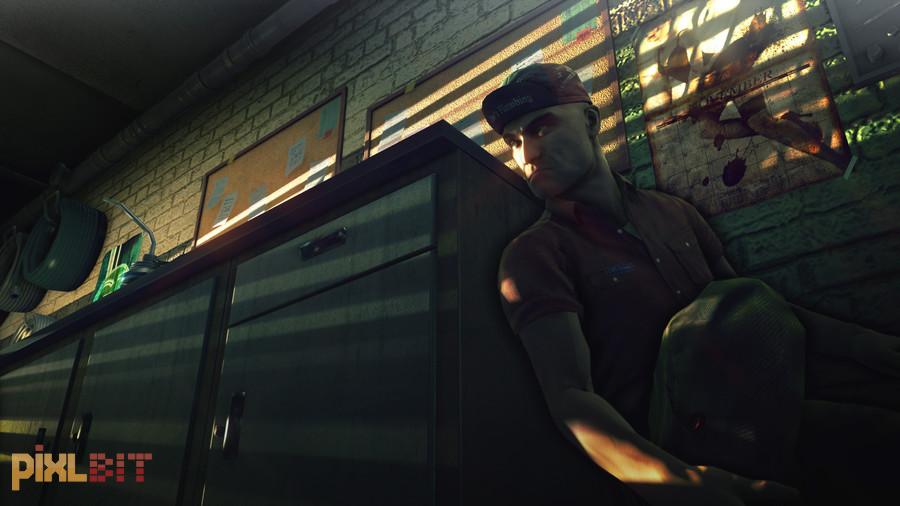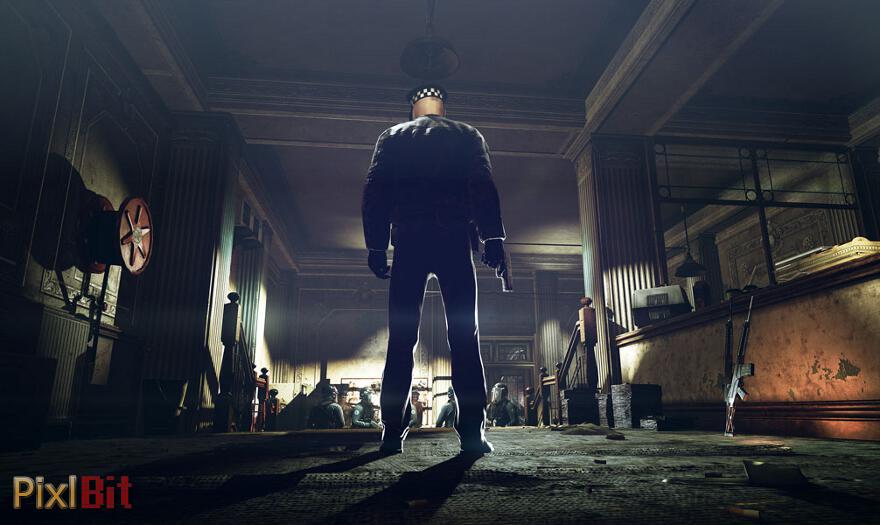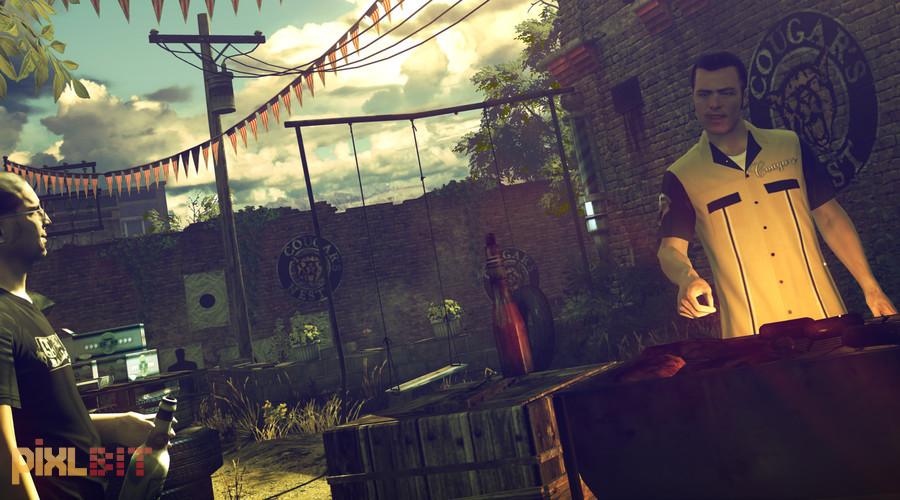Hitman: Absolution Review
|
|
See PixlBit's Review Policies

On 01/03/2013 at 12:00 PM by Julian Titus Good work, 47. The money has been wired to your account. |

Fans of stealth action games that can forgive an overwrought, grindhouse movie type of story.
After thoroughly enjoying 2006’s Hitman: Blood Money, I was excited to see what IO Interactive could do with a truly next gen version of Agent 47’s world. Better tech and graphics should equal a better game, right? Well, yes, but the kind of game that Hitman: Absolution actually is turned out to be a completely different experience than I was hoping for, and it took me a while to reconcile my hopes against the reality of what’s on the disc.
I’m a big fan of story driven video games. Nine times out of ten, I’ll gravitate towards games with a strong narrative over the big action titles out there. Hitman would be that tenth game—the one where I really could not care less about the story as long as I get plenty of intricate assassination puzzles that reward creativity and guile. Unfortunately, this time around IO decided to make a game that centers around its story, often at the expense of that tried and true Hitman gameplay.
Levels are broken into smaller sections, and it’s rare that any of these sections focus on eliminating a specific target. Agent 47 is on the outs with the Agency, and more often than not the goal of a level is to escape pursuit or infiltrate an area. How you choose to do so is still up to you, but without all those wonderful ICA toys, I felt initially very limited in my options.
Not being able to utilize my favorite tricks like drugging food with 47’s syringe or planting a remote mine in a briefcase to cause all sorts of trouble was disappointing for sure. Thankfully, maneuvering around the environments and performing specific tasks has never been easier. IO really came up with an elegant control scheme for Agent 47; slipping into cover and moving from vantage point to vantage point is smooth and effortless. Even when presented with multiple contextual actions at the same time, choosing what you actually want to do is simple and efficient—no more detonating an explosive when you meant to drop it. I may have felt like I had fewer options available at the start of each level, but the excellent controls made me feel like I was the master of my own destiny.
Another way that IO put me in control was with the sophisticated way information is conveyed within the game world and to the player. I knew at a glance when I was considered to be trespassing, which was always a problem in Blood Money, where a disguise that worked on the first floor would alert every guard on the second floor with no warning. The radar does a great job of informing when a noise or distraction has alerted people, and exactly who is curious about what’s going on. Those radar icons will also show the level of alertness of anyone in the vicinity. At any given moment, Agent 47 has all the information he needs to carry out his tasks.
Even with all that info, there are times when 47 is probably going to get spotted. Once again, the way information is conveyed is well done. Unlike most stealth games, getting seen isn’t a surefire path to a game over screen. Eliminating an alerted enemy (as lethally or non-lethally as you like) before he can call for backup will bring everything back to normal. It’s also a simple matter to break away and evade capture, either by finding a hiding place, or getting the jump on someone and taking their clothing as a disguise.
When it comes time to don some duds other than 47’s signature suit, things get a little wonky for my taste. Putting on the uniform of, say, a police officer doesn’t mean that 47 will be able to walk around an area unmolested. Other officers will find him curious, and if he gets close enough he’ll be asked to stop, or the disguise will be blown. Now, it’s always been a little silly that people didn’t question a bald man with a barcode tattooed on the back of his skull that’s dressed up like a doctor, but Absolution takes things to an extreme. People get suspicious about 47’s disguise far too quickly, and often from far enough away that it becomes unbelievable. I understand that IO was trying to make the game more realistic, but they did so at the expense of gameplay. It’s possible to use the new Instinct ability to blend in and avoid suspicion, but Instinct runs out quickly, and it can’t be depended on. Even when I was wearing a disguise I ended up staying in cover as much as possible, because taking a step in the wrong direction was punished by becoming surrounded and thrown into a combat situation.
I don’t recommend being in that situation in Hitman: Absolution. The hand-to-hand combat is an annoying quick time event that is too finicky for its own good, leading to prolonged fistfights and plenty of damage taken. Shooting has never been a strong suit of the series, and even though the gunplay is better this time, I had more than one situation where I had a guy dead to rights in my sights, only to have the bullet whizz past his face instead of going between his eyes like I intended. It’s far more satisfying to go the stealthy route, picking people off one by one. Absolution gives you many of the tools needed to do this, and the rest of them can be procured in the levels, if you’re paying attention.
I just wish that the game focused on that classic Hitman game mechanic of finding a way of eliminating a high-profile target, preferably making it look like an accident and walking out as if nothing happened. When Absolution opens up into levels like that it feels amazing. But that feeling is rare, and instead much of this game feels like a really well-crafted stealth game where the goal is to get from point A to point B. While that can be satisfying by itself (and it was), my greatest moment in the game was rigging the experiments of some shady scientists so that they died seemingly by their own gadgets, and I walked out as a Silent Assassin. Those moments are still in this game, but they are few and far between, as the story takes precedent over the level design.
Thankfully, the Contracts mode allows for more of that vintage Hitman action. This is the “multiplayer” mode of the game, and it lets players create challenges within the framework of the existing game. It’s a novel “play to create” mode; pick a level, choose your starting outfit and loadout, and play the game. As you navigate the environment you can choose up to three targets to eliminate. The game records how you take out your targets, which weapon you used, and what you were wearing when you did. The goal of other players is to try and complete your contract with the criteria you used. Deviating from the set goals is allowed, but it results in less money wired to your account at the end of the level. It’s a great additional mode, but I would have preferred that IO focus on this part for the main game.
I came into Hitman: Absolution wanting a truly HD version of Blood Money, with all the options and freedom that that game afforded me, while looking incredible. Absolution certainly looks amazing, but it wasn’t the game I was expecting. With that said, I came to enjoy my time with Agent 47 quite a bit, and I had just enough of those devious Silent Assassin moments to satisfy me. I could do without the grindhouse-like story and its bizarre cast of nasty characters, but Hitman: Absolution adds enough to the stealth-action formula to make it worth seeking out.












Comments